| Srl | Item |
| 1 |
ID:
122234
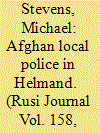

|
|
|
|
|
| Publication |
2013.
|
| Summary/Abstract |
As the end of the British combat role in Helmand approaches, the Afghan Local Police are coming under increasing scrutiny. In the time remaining, British and US mentors are working to reinforce this fragile pillar of the Afghan National Security Forces, knowing that the potential for dramatic success is balanced against the risk of serious failure.
|
|
|
|
|
|
|
|
|
|
|
|
|
|
|
|
| 2 |
ID:
109557
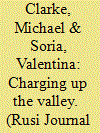

|
|
|
| 3 |
ID:
095971
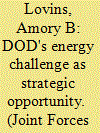

|
|
|
| 4 |
ID:
118462
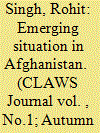

|
|
|
| 5 |
ID:
122220
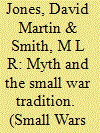

|
|
|
|
|
| Publication |
2013.
|
| Summary/Abstract |
In recent years a number of commentators have posited that the British reputation for conducting small wars has suffered in the wake of setbacks in Iraq and Afghanistan. The argument here contests whether such a tradition can be truly said to have ever existed. A close examination of this supposed tradition reveals it to be a myth. In fact, rarely have the British armed forces claimed a facility for counter-insurgency or small war. Invariably, commentators outside the Army have ascribed the tradition to them. Most notably, commentators in the United States keen to discern practices of minimum force or rapid institutional learning generated the narrative of British COIN expertise. Ultimately, what this myth reveals is that, when deconstructed, it is political will, not an ingrained understanding of fighting insurgencies, that has determined Britain's success, or otherwise, in so-called small wars.
|
|
|
|
|
|
|
|
|
|
|
|
|
|
|
|
| 6 |
ID:
091166
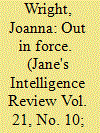

|
|
|
|
|
| Publication |
2009.
|
| Summary/Abstract |
Taken together, the recent United States Marines Corps and British Army operations in Helmand were the largest carried out in Afghanistan since 2001. The International Security Assistance Force (ISAF) now has more than 18,000 personnel in Helmand, the largest military presence in any Afghan provience.
|
|
|
|
|
|
|
|
|
|
|
|
|
|
|
|
| 7 |
ID:
109930


|
|
|
| 8 |
ID:
100569
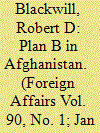

|
|
|
|
|
| Publication |
2011.
|
| Summary/Abstract |
There are no easy or cost-free ways to escape the current quagmire in Afghanistan. Although it has problems, a de facto partition of Afghanistan, in which Washington pursues nation building in the north and counterterrorism in the south, offers an acceptable fallback.
|
|
|
|
|
|
|
|
|
|
|
|
|
|
|
|
| 9 |
ID:
128231
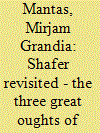

|
|
|
|
|
| Publication |
2013.
|
| Summary/Abstract |
The comprehensive approach, also known as the integrated approach, is foundational to the strategies of the Western countries operating in south Afghanistan. It builds on the same premise as the hearts and minds (HAM) theory: by providing security and basic needs to the population, support is taken away from insurgents. The assumption that a (fragile) state will be able (with support of foreign troops and organisations) to provide basic services, security, and economic prosperity, which was questioned and critiqued by Michael Schafer over two decades ago, is still part of the contemporary concept and seems to remain uncontested. The objective of this article is to test Shafer's claims about the perseverance of what he coined 'the deadly paradigms of counterinsurgency' against the British and Dutch experiences in south Afghanistan starting in 2005.
|
|
|
|
|
|
|
|
|
|
|
|
|
|
|
|
| 10 |
ID:
123982
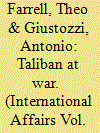

|
|
|
|
|
| Publication |
2013.
|
| Summary/Abstract |
In seeking to explain why and how the war in Afghanistan has dragged on, most analysis has focused on the western and Afghan government effort. This article examines how the war looks from the perspective of the insurgency. Using Helmand province as a case-study, the authors draw on a large number of original interviews with Taliban field commanders and fighters to produce a uniquely detailed picture of the Taliban at war.
In the first section, the article explores how the Taliban returned to Helmand from 2004 to 2006, and show how the British made the situation far worse when they deployed forces to Helmand in 2006. In the second part of the article the authors examine the evolution of the Taliban insurgency in Helmand since 2006. They show how the Taliban has developed an increasingly centralized organizational structure, a more militarized shadow government and greater professionalism of field units.
The overall picture that emerges is of a resilient insurgency that has adapted under immense military pressure. The Taliban have suffered very heavy attrition in Helmand, but they are far from defeated.
|
|
|
|
|
|
|
|
|
|
|
|
|
|
|
|
| 11 |
ID:
096698
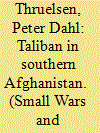

|
|
|
|
|
| Publication |
2010.
|
| Summary/Abstract |
This article gives an in-depth description and analysis of the Taliban insurgency in southern Afghanistan in 2008. It describes the local dynamics of the insurgency and argues that the Taliban should not be seen as a unified hierarchical actor that can be dealt with as part of a generic approach covering the whole of Afghanistan. The article will show that the insurgency in southern Afghanistan is highly localised in nature, being to a large extent driven by local commanders and local area networks often centred on individual commanders themselves. It will also show that the driver or cause behind the insurgency differ for the local Afghan Taliban and the foreign Pakistani Taliban respectively. The nature of the southern insurgency, with the local Taliban commanders working through local knowledge networks with a locally determined cause, implies that a strategic-level 'peace deal' with Tier I of the strategic Taliban leadership will not create the desired effect of ending the insurgency - there will not be an overall domino effect in these parts of the country.
|
|
|
|
|
|
|
|
|
|
|
|
|
|
|
|
| 12 |
ID:
096861
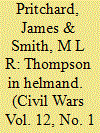

|
|
|
|
|
| Publication |
2010.
|
| Summary/Abstract |
British operations in Helmand province, Afghanistan, have been contextualised within the theory and practice of counter-insurgency. The theories of Sir Robert Thompson are held to represent the basis for successful counter-insurgency campaigning. This analysis takes the simple premise of posing the question as to whether British conduct in Helmand between 2006 and 2008 has represented the effective utilisation of Thompson's principles. Evaluating the evolution of British operations on the ground this analysis suggests that while the influence of Thompson's thinking can be clearly detected, in practice the implementation of his precepts have been undermined and negated by a variety of factors, most notably the weaknesses of the government of Afghanistan. The result has been an ever-greater focus on the prosecution of the military campaign to the exclusion of the multifaceted programme advocated by Thompson. In conclusion, it may be contended the campaign in Helmand does not resemble the ideals outlined by Thompson or, indeed, much of an effective counter-insurgency plan.
|
|
|
|
|
|
|
|
|
|
|
|
|
|
|
|
| 13 |
ID:
115527
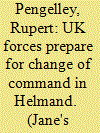

|
|
|
| 14 |
ID:
095063
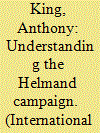

|
|
|
|
|
| Publication |
2010.
|
| Summary/Abstract |
British forces are now engaged in a major operation in southern Afghanistan, the outcome of which is likely to be strategically decisive-especially for the configuration and status of Britain's land forces. Although progress seems to have been made, there has been much criticism of the campaign. Through an analysis of the three-year Helmand mission (Operation Herrick), this article explores whether, for all the improvements in the campaign in terms of resources and numbers of troops, the basic structure of the campaign established in 2006 has endured. Instead of focusing on an 'ink-spot' from which to expand, British forces have tended to operate from dispersed forward operating bases from which they have insufficient combat power to dominate terrain and secure the population. They are consequently engaged in a seemingly endless round of high-intensity tactical battles which are normally successful in themselves but do not contribute to the overarching security of the province. The analysis explores the way in which this distinctive campaign lay-down-the preference for dispersal and high-intensity fighting-may be a reflection of British military culture and its military doctrine. By highlighting potential unacknowledged aspects of the British military profession, the article aims to contribute to debates about the development of the armed forces.
|
|
|
|
|
|
|
|
|
|
|
|
|
|
|
|
| 15 |
ID:
110928
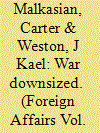

|
|
|
|
|
| Publication |
2012.
|
| Summary/Abstract |
The United States, facing deepening economic and fiscal woes at home, is preparing to withdraw from Afghanistan. More and more policymakers, congressional representatives, and members of the public are calling for the majority of U.S. forces to pull out as quickly as possible and for Washington to shift from an expensive counterinsurgency strategy, in which tens of thousands of U.S. and NATO troops protect the Afghan population, to a cheaper counterterrorism strategy, in which special operations forces strike at terrorist leaders in Afghanistan and Pakistan and the Afghans are left largely on their own.
|
|
|
|
|
|
|
|
|
|
|
|
|
|
|
|
| 16 |
ID:
128634
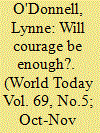

|
|
|